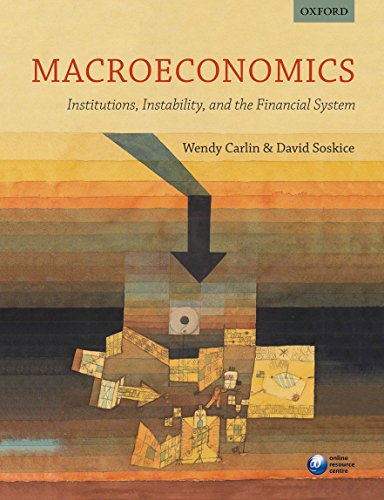Macroeconomics
Institutions, Instability, and the Financial System
Wendy Carlin; David Soskice
BOOK REVIEW

In the intricate web of economic theory and practice, Macroeconomics: Institutions, Instability, and the Financial System emerges not merely as a textbook but as a transformative journey into the very heart of how economies function. Written by the formidable duo Wendy Carlin and David Soskice, this work delves deep into the institutions that underpin macroeconomic stability, the cyclical nature of economic crises, and the role that financial systems play in shaping the economic landscape. What feels like a dense academic tome at first glance becomes a portal into understanding the complexities that govern our financial realities.
The authors don't simply regurgitate theories; they elevate them, challenging you-yes, you!-to rethink assumptions about how economies operate. They unravel the delicate dance between institutions and policy frameworks. Their insights on how institutional arrangements can lead to varying economic outcomes are not just academic discourse; they're invitations for change. Reflect on this: how often have financial crises felt unpredictable and chaotic? Carlin and Soskice argue that beneath this chaos lies a structured instability-a pattern yearning to be understood. 🌍
Their intricate analysis is peppered with real-world examples that animate these theories, making it nearly impossible to resist acknowledging the profound impact of economic systems on daily life. Reader responses have been a testament to this. Critics cite the book's accessibility even while grappling with complex concepts, finding a bridge between theoretical economics and practical implications. Others, however, argue that it may lean too heavily on established theories without offering enough fresh perspectives. But therein lies the beauty: it propels you to debate, to dissect, to engage with economic thought in ways previously unimagined.
Consider the historical context in which this work was birthed. Written in an era punctuated by the Great Recession and its reverberations globally, it challenges the status quo of economic thinking. The 2008 financial crisis wasn't merely an economic downshift; it was a clarion call for reevaluating how we articulate and respond to economic policy. The authors, through their vivid discourse, become not only chroniclers of economic theory but also prophetic voices urging for reform and a reimagining of institutional roles. You can almost hear the rumbles of market instability and the urgent need for a paradigm shift as you read through their arguments.
Yet, what truly sets this book apart is its call to action. It doesn't just aim to inform; it strives to make you feel the pulse of economic dynamics. You're not just a passive observer in this discourse; you're dragged into the intricacies of decision-making processes and policy impacts. The authors compel you to view economic fluctuations not as distant phenomena but as immediate challenges requiring civic engagement and thoughtful policy formulation.
As you navigate this journey through chapters laden with rich analysis, prepare for the emotional rollercoaster that comes with grappling with concepts like market failure, institutional rigidity, and the fragility of economic systems. The tension between theoretical musings and the tangible implications of these theories can evoke an array of feelings-curiosity, frustration, empowerment. It's a vivid reminder that behind every economic theory lies human experience, with all its inherent messiness and unpredictability.
For those who dare to dive into Macroeconomics: Institutions, Instability, and the Financial System, be ready to shed ignorance and embrace a revamped understanding of the economic world around you. This isn't just a read; it's a challenge, a stirring of the pot that may leave you questioning established norms and pushing for systemic change. It's an intellectual endeavor wrapped in an emotional experience, one that will resonate long after you've turned the last page. 🌌
In a time when economic literacy is more crucial than ever, Carlin and Soskice provide a framework, but they leave space for your voice to echo in the conversations that arise from their insights. This work is not just about learning; it's about evolving, and in this evolution lies the essence of vibrant economic discourse. Don't be left behind; engage with these ideas and let them fuel your understanding of the world we live in. 🚀
📖 Macroeconomics: Institutions, Instability, and the Financial System
✍ by Wendy Carlin; David Soskice
🧾 680 pages
2014
#macroeconomics #institutions #instability #financial #system #wendy #carlin #WendyCarlin #david #soskice #DavidSoskice